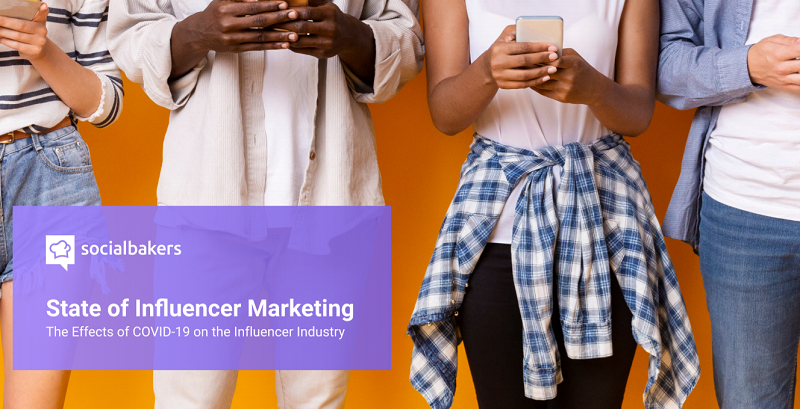Brands working with influencers has fallen by 37 and its efficiency fell by 41% as budgets face further cuts amid the Covid-19 pandemic, according to new research.
With budgets still under a squeeze, brand marketers are making sure each penny is being spent wisely. Socialbakers’ latest State of Influencer Marketing report lays bare the impact of COVID-19 on influencer marketing over the last three months.
Key findings include:
- Brands on Instagram working with influencers dropped by 37% in April 2020 compared to last year, while Instagram influencers using #ad decreased by 30%
- Influencer marketing efficiency (the ratio of average interactions on an influencer’s branded post vs. a brand’s organic post) fell by 40%
- Partnerships with micro-influencers (>10,000) grew hugely in 2020, as brands created less costly campaigns
- Pretty Little Thing, Boots and Sainsbury’s ranked top for influencer use in the UK (see below data)
- Influencer marketing is most effective for extra small brands, with less than 10,000 followers, and least effective for extra-large brands with over 1,000,000 followers
“Despite the economic impact of COVID-19, brands are still investing in influencer marketing to reach their target audiences, but with a distinctly different approach,” said Yuval Ben-Itzhak, CEO, Socialbakers. “Nano and micro influencers are now seen as high-value resources, bringing high impact without the big price tag of macro and mega influencers. As budgets remain tight, savvy brands will likely continue to expand partnerships with these smaller influencers as part of a smarter social media strategy in the wake of the continuing worldwide pandemic.”
Influencer marketing slows as budgets tighten
Socialbakers data shows that both the amount of sponsored content posted by Instagram influencers, and the number of brands who partner with influencers, dropped significantly compared to last year. In April 2020, the number of Instagram influencers cooperating with brands who used #ad decreased by 30% compared to April 2019. The decrease of #ad usage in 2020 was likely tied to the worldwide pandemic. At the same time, the number of brands on Instagram cooperating with influencers in April 2020 dropped by 37% compared to April 2019.
In the UK, the brands engaging most with influencers from January to March 2020 included Pretty Little Thing, with 611 mentions by 177 influencers; Boots, with 155 mentions by 132 influencers; and Sainsbury’s, with 110 mentions by 95 influencers.

(Socialbakers’ data)
Influencer efficiency also drops, as extra-small brands gain traction
There was also a sharp 41% drop in Influencer Marketing Efficiency – the ratio of average interactions on an influencer’s post mentioning the brand, compared to a post published by the brand itself – compared to April 2019. Following the rise and fall of this metric during the holiday season, efficiency likely decreased in the spring due to the pandemic.
This story is not the same across industries, with high-performing Influencer Marketing Efficiency scores in Healthcare (4.2x), Finance (3.9x), Telecom (3.8x) and Accommodation (2.7x). On the other end of the spectrum, industries such as Auto (0.6x), Sporting Goods (0.4x), and Airlines (0.2x) were not able to find effective influencer partnerships. However, extra-small brands seem to be the big winners when partnering with influencers. They achieved the highest efficiency from their influencer campaigns when they partnered with small or larger influencers.

Brands move to smaller influencers for less costly campaigns
As brands cope with tighter marketing budgets, the data shows they are increasingly investing in influencers with smaller followings. Over the last 16 months, over 40% of all brand partnerships were with smaller influencers with between 10,000-50,000 followers. The next largest share, which started growing again in 2020, and sharply since the pandemic hit, was micro influencers with fewer than 10,000 followers. Mega influencers were involved in the least amount of brand partnerships, at less than 3%.
In April 2020, 33.3% of all Instagram influencers cooperating with brands were nano influencers, and 31.9% of all #ad posts came from nano influencers. That’s the highest those percentages have been since June 2019. Of all the brand cooperations that Socialbakers analyzed, nearly 94% were micro-influencers with fewer than 100,000 followers. This points to a belief among brands that positive campaign results can be achieved with smaller, more authentic influencers that are closer to their real public.
The Socialbakers State of Influencer Marketing Report is now available for download.

